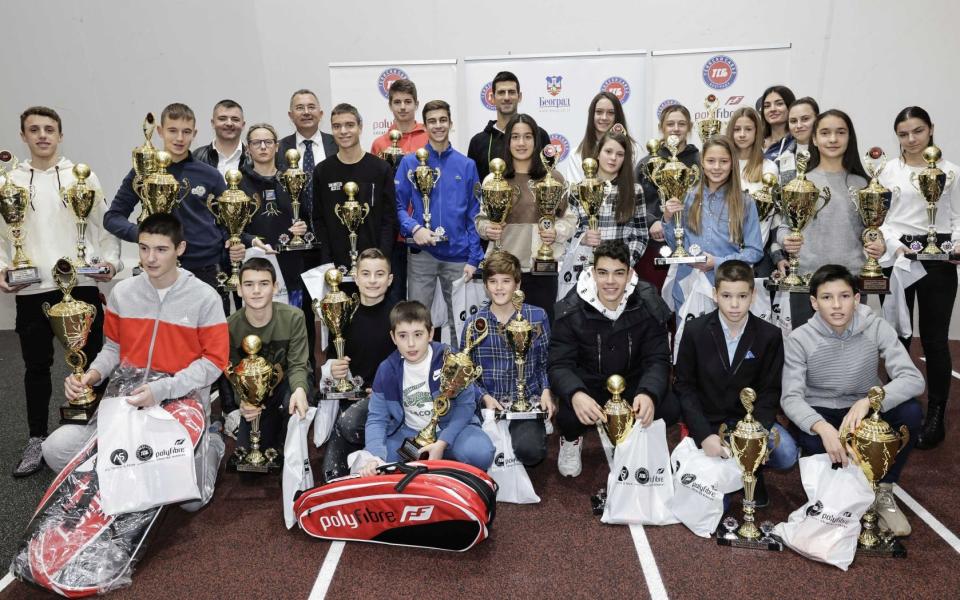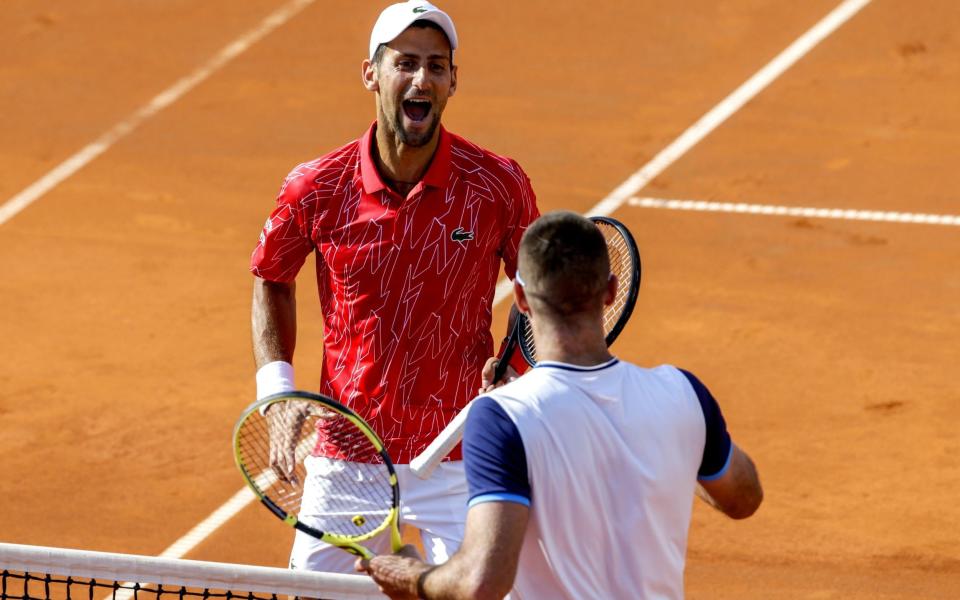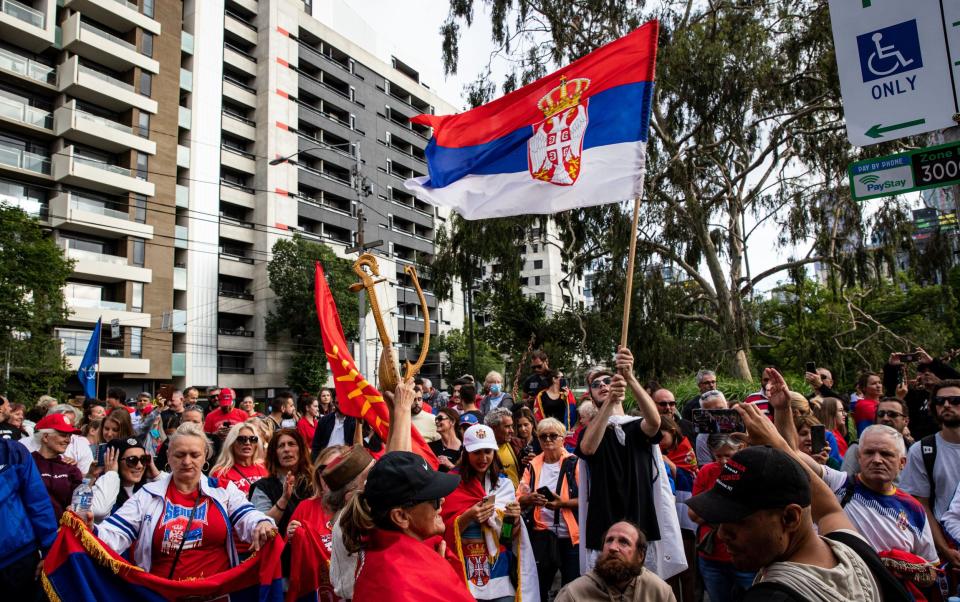The PR disaster that holds the key to Novak Djokovic's Australian Open hopes

As Novak Djokovic handed out the gongs at a youth tennis gala in Belgrade on Dec 17, Serbian sporting chiefs were scrambling to avoid more Covid embarrassment for their biggest star.
Another pandemic PR disaster – 18 months after he had to apologise over an alleged superspreading event – was always the biggest risk for the national hero ahead of the Australian Open.
To see off potential criticism at the time, Djokovic, the federation explained, would only meet “award-winning children, without a wider audience due to epidemiological measures”.
However, now it is his decision merely to leave home that day which is causing the greatest concern ahead of his fate being decided in Australia on Monday. Ahead of a hearing to finally decide whether he can be allowed entry to compete, his legal team told the Federal Circuit and Family Court on Saturday that the player tested positive on Dec 16.
There may be an innocent explanation for Djokovic pressing ahead with attending the Belgrade awards ceremony, posing mask-free alongside dozens of youngsters. The legal papers did not specify whether he had taken the test after experiencing symptoms or whether he had been notified of the result on the same day that it was recorded.
But public health experts say Djokovic should now feel “morally compelled” to set out the exact chain of events to reassure the public over his movements. “There is an obvious duty to clarify things as it doesn’t sound like responsible behaviour,” said Prof Gabriel Scally, president of the epidemiology and public health section of the Royal Society of Medicine. “We have to establish why he had the test, because, of course, he might have had Covid weeks previously. However, if he was symptomatic or if it was a screening test, then he should have been isolating.”
The latest twist in Djokovic’s pandemic saga draws a sharp contrast with the events of July 2020, when he was much more forthcoming about the details of his first positive test.
Sport's most high profile anti-vaxxer had caught the virus then, along with his wife, Jelena, as the sport resumed from a four-month lockdown. Having joined three other leading players and two trainers infected by the disease towards the end of his unsanctioned Adria Tour, he appeared to recognise the error of his ways. He said Covid was “the new reality”, although he had organised his tour “with a philanthropic idea” and said he was sorry for the other people who tested positive.

However, while that saga caused him immense public embarrassment, his second positive test last month could play a part in wrecking his dreams of being crowned the world’s greatest tennis player.
Setting out a timeline of his visa wrangles with Australia for the first time, his lawyers said on Saturday that he had received a letter from immigration authorities days before arrival stating that he met “the requirements for a quarantine-free” entrance.
He then got the letter from Australia’s Department of Home Affairs on New Year’s Day, the court documents said. “Mr Djokovic understood that he was entitled to enter Australia and Victoria and to compete in the Australian Tennis Open,” his lawyers add.
But it is the revelation around Djokovic’s positive test on Dec 16 that prompts the most confusion in the 136-point statement. According to reports online, Djokovic appeared at several functions that same day, including unveiling some new postage stamps bearing his image.
In addition, while a positive test within recent months is a valid exemption reason with border authorities, the stated date would have been too late for the Tennis Australia deadline of Dec 10. The only reference contained in the legal papers was that “the date of the first positive Covid PCR test was recorded on 16 Dec 2021”.
Meanwhile, Djokovic, who is refusing to give up on plans to play for his 21st Grand Slam at the Australian Open later this month, begins his fourth day in immigration detention in Melbourne today.
“I explained that I had been recently infected with Covid in Dec 2021 and on this basis I was entitled to a medical exemption in accordance with Australian Government rules and guidance,” Djokovic said in the filing about his experience being detained at Melbourne Airport. By Dec 30, he “had not had a fever or respiratory symptoms of Covid-19 in the last 72 hours”, the filing said.
Djokovic said he had expressed “shock, “surprise” and “confusion” when he was held overnight, and had a bed prepared near his airport interview room so he could rest while waiting until the morning when he would be able to reach legal representatives and Tennis Australia.
Customs officers ultimately “pressured” Djokovic to undertake an interview before he had spoken to either, the filing said. Tennis Australia said it never knowingly misled players and had always urged them to be vaccinated, after News Corp papers published a document from the organising body apparently advising players on ways to enter the country with a medical exemption from vaccination. “We reject completely that the playing group was knowingly misled,” Tennis Australia said in a statement quoted by local media.
Djokovic’s case has already sparked one of the biggest international diplomatic spats in recent sporting history, with Serbian president Aleksandar Vucic this week decrying what he called a “political witch hunt.” Djokovic’s parents have also spoken out, criticising Australian authorities for “trying to crucify and belittle Novak and throw him to his knees.” Djokovic supporters, meanwhile, have staged candlelight vigils and protests outside the Park Hotel.

Czech women’s doubles player Renata Voracova also had her visa cancelled and was sent to the hotel after entering the Australian tournament on a similar vaccine exemption.
Reflecting on the past week, Prof Scally, a foremost public health expert who sits on Independent Sage, says Djokovic only deserved a limited amount of sympathy due to “huge cost” caused to public health services by anti-vaxxers.
“I think there is in general growing intolerance of people who willfully won’t get vaccinated,” he said, having monitored reactions to the furore. “It’s just such a very bad example – not being vaccinated and then travelling widely, being in contact with other people. Our sympathy can only go so far.”

